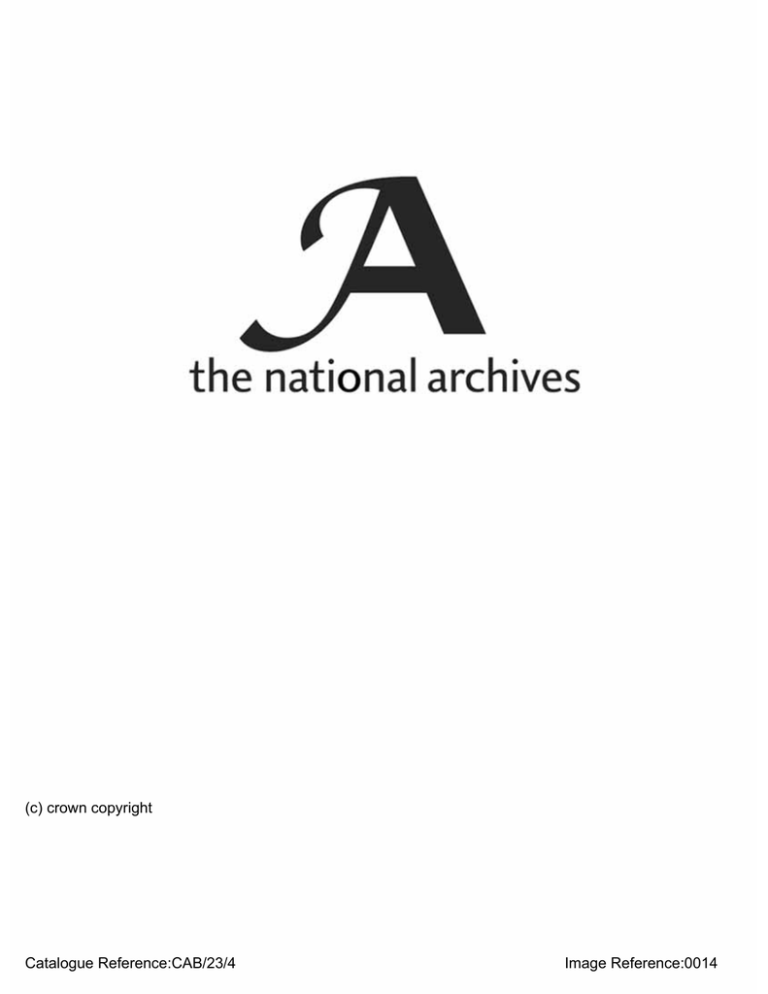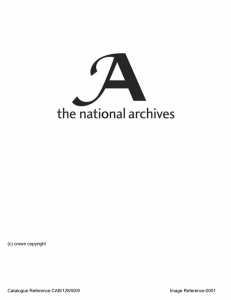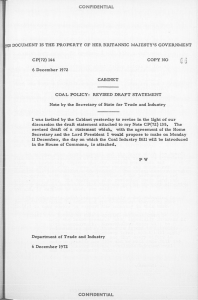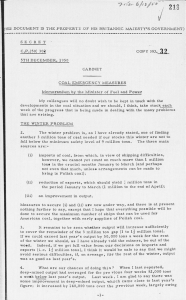(c) crown copyright Catalogue Reference:CAB/23/4 Image Reference:0014
advertisement

(c) crown copyright Catalogue Reference:CAB/23/4 Image Reference:0014 [This Document is the Property of His Britannic Majesty s Government.] Printed for the War Cabinet. October 1917. SECRET. 65 WAR CABINET, 2 4 0 . Minutes of a Meeting of the War Cabinet, held at 1 0 , Downing Street, on Thursday, September 2 7 , 1 9 1 7 , at 1 1 * 3 0 A.M. S.W., Present: T H E PRIME MINISTER (in the Chair). T h e R i g h t Hon. the EARL CURZON OF j T h e R i g h t Hon. G . N . BARNES, M.P. KEDLESTON, K . G . , G . C . S . I . , G . C . I . E . the Lieutenant-General T h e R i g h t Hon. the VISCOUNT MILNER, G.C.B.. G.C.M.G. Right Hon. J . C. SMUTS, K . C . The Right. Hon. S I R EDWARD CARSON, K G , ALP. T h e following were also present : The Right Hon. A. J . BALFOUR, O.M., M.P., Secretary of State for Foreign Affairs (for Minutes 8 a n d 1 1 ) . T h e R i g h t Hon. the E A R L OF DERBY, K.G., G.C.V.O., C.B., Secretary of State for W a r (for Minutes 1 to 4, and 1 1 ) . General S I R W . R . ROBERTSON, G.C.B., K.C.V.O., D.S.O., Chief of t h e Imperial General Staff (for Minutes 1 to 4, a n d 11). Admiral SIR J . R. JELLICOE, G.C.B., O.M.. G.O.V.O., First Sea L o r d a n d Chief of t h e Naval Staff (for Minutes 5, G, 7 , and 1 1 ) . T h e R i g h t Hon. Sir G . CAVE, K G , M.P., " Secretary of State for Home Affairs (for Minute 1 0 ) . T h e R i g h t Hon. G . H. ROBERTS, M.P., Minister of Labour (for Minute 1 0 ) . The Right Hon. Sir A. STANLEY, M.P., President of t h e Board of T r a d e (for Minute 1 0 ) . Mr. G U Y CALTHROP, Coal Controller (for Minute 1 0 ) . Lieutenant-Colonel S I R M. P . A. HANKEY, K.C.B., Mr. THOMAS JONES, Assistant Major L. STORR, Assistant Secretary. Secretary. Secretary. 1. T H E W a r Cabinet had a short discussion on t h e question of Air Raids, in t h e course of which it was pointed out t h a t t h e r e is a tendency on t h e p a r t of t h e public to crowd u n d e r g r o u n d railway­ stations in anticipation of a n Air Raid, even when no warning h a s been issued. I t was suggested that t h e authorities concerned should make better a r r a n g e m e n t s for r e g u l a t i n g t h e use of t h e passages a n d platforms of the u n d e r g r o u n d railways during a Raid. I t was further suggested that t h e P r e s s should be asked to' emphasise t h e fact that the -noise m a d e b y t h e anti-aircraft defensive B [t 3 6 5 - 2 4 0 ] Air Eaids. 65 artillery was often mistaken for the b u r s t i n g of bombs, which gave the impression that the n u m b e r of bombs dropped was far larger t h a n the reality. T h e Chief of the Imperial General Staff was authorised to t h a n k the P r e s s for the attitude that they had taken u p towards recent attacks, and should invite t h e m to qall attention to t h e confusion between the b u r s t i n g of bombs and fire of artillery. The Western Front. 2. The Chief of the Imperial General Staff reported that since the last battle the G e r m a n s h a d p u t in nine divisions, which indicated that they were u s i n g u p their divisions very rapidly. On the previous day four s t r o n g counter-attacks h a d been made by the enemy between 4 and 7 P.M., the most severe of which w as south of t h e Polygon Wood. All attacks had been repulsed and the German losses h a d been extremely heavy. . Our troops h a d retained all the ground that they h a d captured. The Prime Minister remarked on the poor condition of the G e r m a n prisoners whom h e h a d seen on the 26th instant, d u r i n g his recent visit to the British front in Flanders, and upon the very good spirit which prevailed a m o n g all r a n k s of our own army that he h a d seen a n d conversed with. T h e enemy system of concrete block­ houses, commonly known as "pill-boxes," appeared to have been mastered by our troops. r The Eastern Front. ^ General Staff read extracts from a telegram he h a d received from General Barter, giving General Alexeiefs reasons for declining to take office, among which was his insistence that the Commissaries should not be permitted to interfere in any way at the front. General Barter said t h a t the opinion was held in certain quarters that the Bolsheviks m i g h t get into power, in which case there w a s a possibility of a separate peace. General Barter believed, however, t h a t the Bolshevik Committees outside the P e t r o g r a d area would be opposed to this. I t was further stated that M. Kerensky's power was on the wane. The Italian Front: W i t h d r a w a l of Guns. Their Disposal. 4. T h e Chief of t h e Imperial General Staff read a communication from General Cadorna to the effect that he had given orders for the release of the British heavy g u n s which had been lent to h i m for the recent offensive. General Robertson said that he h a d suggested to General Cadorna t h a t these g u n s might now be released, as they h a d been lent for the offensive ; and, as it appeared that the Italian armies would now act on the defensive, h e assumed they would no longer be required. General Cadorna, in his reply, had laid stress upon the fact that he alone was in a position to decide whether the offensive or the defensive should be adopted on h i s front. As regards the disposal of the above guns, the Chief of the Imperial General Staff stated that plans h a d been considered for reinforcing the Italians with heavy artillery next year, and, in view of our own deficiency in personnel, the alternative h a d been con­ sidered of sending g u n s to Italy without the personnel. This pro­ posal was open to the objection that it would b e difficult in such circumstances to secure the r e t u r n of the g u n s . It h a d also been suggested that the personnel of these batteries might be m a d e u p partly of Italian and partly of British gunners. . No final decision, however, had been reached. General Kobertson said that, should the W a r Cabinet decide to send g u n s to Italy without their personnel, it would be necessary now to leave some of the guns recently lent with the Italians lor instructional purposes, a n d General DelmeRadcliffe had m a d e a proposal to this effect. g T h e c h i e f q £ I m p e r i a l As regards the proposal to divert British guns withdrawn from the Italian front to Palestine, General Robertson expressed himself as doubtful whether they could all be made use of in that theatre. Each battery required two trains for its transportation, and it was only possible to r u n seven or eight trains a day between Egypt and the Gaza front. On the other hand, the Prime Minister attached great importance to the necessity for giving heavy artillery support to General Allen by, in view of the formidable nature of the Turkish defences. General Robertson stated that General Allenby had been given everything that he had asked for. With a view to a decision, however, he undertook to ascertain from General Allenby how many g u n s he could make use of. Seaplanes. 5. T h e First Sea Lord reported that two of three aircraft flown from the " Vindex " to attack the Zeppelins in the recent raid failed to return. A later report stated that one seaplane with two men had been towed to Holland ; the other had probably been lost. Submarines. 6 T h e First Sea Lord reported that the oiler " San Zaferino " was torpedoed 30 miles from the Smalls early that morning. The enemy submarine appeared on the surface about 1,000 yards away. Our " P 61 " opened fire and obtained a hit. She then" rammed the enemy at full speed, and the submarine sank stern first; a loud explosion followed. Two men subsequently came to the surface, one of whom, the commanding officer, was rescued. The oiler had been towed in. Bombing 7. The First Sea Lord reported that bombing raids were made on the night of the 25th/26th instant at Thourout, Lichtervelde, and Cortemarck Junctions. Several direct hits had been observed in each case. All machines had returned safelv. Raids. The Berne Peace Congress : I s s u e of P a s s p o r t s . 8. T h e Secretary of State for Foreign Affairs referred to Sir Horace RumbohFs telegram No. 866, dated the 21th September, 1917, in which it was stated that among the delegates said to be expected at a forthcoming International Peace Congress at Berne were three or more Englishmen, including Mr. Charles Buxton, Mr. J. A. Flobson, and Mr. \V. H. Dickinson, M.P. Mr. Balfour asked for the instructions of the War Cabinet in the event of the British representatives applying to the Foreign Office for passports. It was pointed out that it would be hardly consistent to g r a n t passports to these delegates seeing that they had been refused to Labour representatives who had desired to attend the Stockholm Conference. The Secretary of State for Foreign Affairs was authorised b y the W a r Cabinet, in the above event, to refuse to issue passports, on the broad grounds that His Majesty's Government could not countenance unauthorised negotia­ tions with the enemy. Electoral Reform. 9. Mr. Barnes stated that, at a meeting of the Labour Party, held yesterday, the future of the Electoral Reform Bill was discussed. A suggestion was made at, the meeting t h a t there was a plot on foot to delay the progress of the Bill in the House of Lords. Lord Curzon stated that he knew of no such plot, b u t it was impossible to foretell what attitude the Llouse of Lords might assume towards the Bill when it reached their Lordships. Sorno [1365-2401 B 2 m i g h t wish to have a referendum on t h e question of women's v o t e s ; others might wish some guarantees as to the proposed reform of the House of Lords. Coal Miners' iDemand for Increase of Wages. JO. T h e W a r Cabinet resumed their consideration of the negotiations which were proceeding between the Coal Controller a n d Miners' Federation ( W a r Cabinet 23(f, Minute 14). Sir Albert Stanley reported that the Miners' delegates h a d decided to adhere to their demand for an advance of 10s. per week per man. T h e original demand for an advance of 25 per cent, would have cost from 25,000,000Z. to 30,000,OOOZ. per a n n u m . T h e addition of 10s. would b r i n g the average wage increase d u r i n g the war u p to about 65 per cent. T h e Coal Controller stated t h a t the men Avere out of h a n d , a n d the leaders were not leading, b u t were being pushed forward. There had been evidence of this in connection with r e c r u i t i n g arrangements, to which the leaders h a d agreed, b u t which the m e n had afterwards rejected. The men based their claims for t h e present increase on the fact that t h e cost of living h a d risen d u r i n g the war by S3 per cent. They also alleged that 50 per cent, of t h e miners have to pay for tools and explosives, t h e cost of w h i c h h a d gone u p d u r i n g t h e war. In the view of the owners whom h e h a d consulted, any stoppage would last for at least a fortnight. There was undoubtedly a fair proportion of loyal m e n among the miners, b u t once a strike began it would be difficult to stop the loyal m e n from joining their comrades from a sense of solidarity. With regard to stocks of coal in the country, the munition works m i g h t carry on, r a t h e r badly, for ten days. T h e r e was little space for much storage in the new factories. In recent strikes in the Midlands great pressure had been brought on t h e Department to secure the r e t u r n of the men to work owing to the shortage of coal. T h e Minister of Labour said t h a t the aspect of the problem which he wished to emphasise was the effect any concession to the miners would have on? the other industries. T h e railwaymen were already passing resolutions in favour of an advance of 11. p e r wee . The engineers have been m a k i n g demands on the Ministry of Munitions. D e m a n d s for advances would, in fact, be general in October, a n d the cost of meeting these on the scale p u t forward by the miners would involve the country in tens of millions of pounds. I n fact, it m i g h t become a question for consideration whether the cumulative effect of these universal demands m i g h t not even prevent us from carrying on the war. T h e Cabinet w ere impressed with the gravity of the situation presented to them b y the Board of Trade and the Minister of Labour. On the one hand, to concede the full demand of the miners would be a precedent for other workers who u p to the present h a d been g r a n t e d increases on a far less generous scale t h a n the miners. Further, the miners were deliberately ignoring the important a n d costly efforts which were being m a d e by the Government to reduce the price of commodities to the consumer. On the other hand, the Government could not embark on a conflict with the miners unless they were certain to bring it to a victorious issue. This, it was generally agreed, was more than doubtful, as the Government were bound to recognise the insistent demands by the war Departments, to whom even a f o r t n i g h t s interruption of coal supplies would be perilous, and a strike running, as it probably would, to perhaps six weeks, disastrous to the conduct of the war. We, had to bear in mind not only our own need of aeroplanes and ships, which were absolutely vital to us, but also t h e undesirable results which would follow if the supplies of coal to F r a n c e a n d Italy were b r o u g h t to a standstill. A great strike would therefore be equivalent to a military defeat. Nor would it perhaps be easy 'to convince the general public that the Government were justified in p e r m i t t i n g t h e r WG 240 5 a colossal dislocation of the nation's industries in the midst of war for t h e sake of a difference of half-a-crown—for so it would, he popularly represented. T h e W a r Cabinet, while recognising that the demand by the miners was unreasonable and deeply to be deplored, decided t h a i Owing to the exigencies of the war they had no option b u t to authorise the Coal Controller to negotiate u p to a m a x i m u m of I s . 8d. p e r day for m e n and iOd. per day for boys.'* T h e W a r Cabinet requested— T h e President of the Board of T r a d e to report later on the question how far the extra cost of the coal, following on the present increase of wages, should be charged to industrial and domestic consumers respectively. T h e question of securing in the agreement with the miners a condition that wages should in future be reduced pari passu with reductions in the cost of living was left open. Anglo-French Conference a t Boulogne, September 25,1917. 11. The Prime Minister drew the attention of the W a r Cabinet to the short summary of Conclusions reached at the Anglo-French Conference at Boulogne on the 25th September, 1917, which had already been circulated to the W a r Cabinet (Appendix). He also gave t h e W a r Cabinet particulars of his private conversations with M. Painleve, the French President of the Council. 2, Whitehall Gardens, S.W., September 27, 1917. * Lord Curzon and Lord Conclusion m i g h t be recorded. Milner asked that their dissent from this APPENDIX. (I.C.-27.) Conclusions of an Anglo-French Conference, held in the train at Boidogne, on September 25, 1917, at 3 T 5 P.M. The Italian Front. 1. T H E British and F r e n c h Governments, while greatly regretting the decision of General Cadorna not to p u r s u e t h e offensive operations, for which 100 French guns were recently sent to the Italian front, are agreed that no action can usefully he t a k e n in order to obtain a reversal of this decision. T h e whole of t h e British a n d F r e n c h heavy artillery will in consequence be w i t h d r a w n from the Italian front. E x t e n s i o n of t h e British Line on the Western Front. 2. T h e British Government h a v i n g accepted in principle t h e extension of the line held by the British army on the Western front, the two Governments are agreed that the question of the amount of the extension a n d the time at which it should take place should be left for arrangement between the two Commanders-in-chief. Military Operations m Turkey. 3. General Foch expressed the view t h a t an operation on t h e T u r k i s h littoral, directed against the T u r k i s h communications, can only succeed in conjunction with a successful advance by t h e British army i n Palestine, combined with a successful holding operation in Mesopotamia. H e undertook to study the question of such an operation designed to exploit any success which might b e achieved by the Allied armies in Palestine a n d Mesopotamia, on t h e u n d e r s t a n d i n g that the British Government Avill render substantial assistance in the matter of shipping transport and naval escorts. General Foch undertook to transmit his observations to t h e British Government b y Monday next. The Equipment of e ree- rmy. 4 General Foch laid great stress on the importance to t h e Allies of e q u i p p i n g and p r e p a r i n g the Greek army, which, he pointed out, afforded an opportunity to the Allies for increasing their force at Salonica by three existing and three new divisions without t h e necessity of t r a n s p o r t i n g them. I n particular, he asked the British Government to u n d e r t a k e the supply of forty heavy g u n s . T h e British Government undertook to consider this request in conjunction w i t h other requests for heavy guns received from Russia, Roumania, and Italy. Boidogne, September 25, 1917. o




